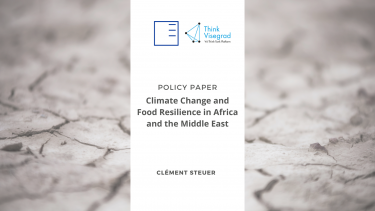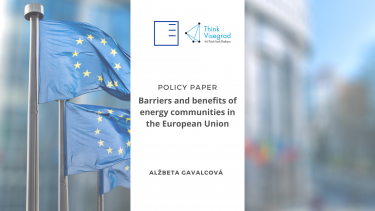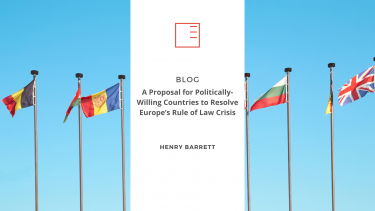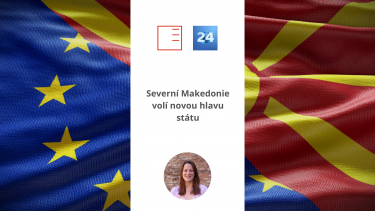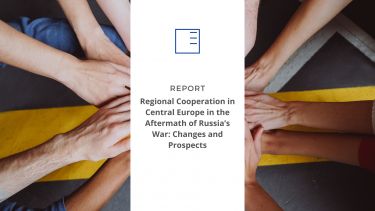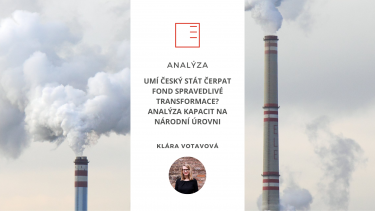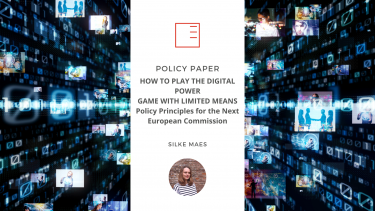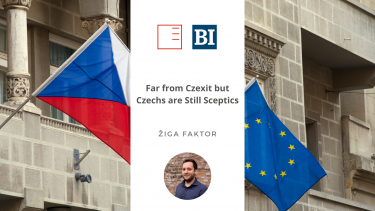Policy Paper | Climate Change and Food Resilience in Africa and the Middle East
Russia's war in Ukraine has destabilised supply chains and strained food systems in Africa and the Middle East, highlighting their vulnerability and the need to increase their resilience. Writes Clément Steuer, Senior Research Fellow at the Institute of International Relations Prague.
Show morePolicy Paper | Barriers and benefits of energy communities in the European Union
Energy communities are an effective means to decentralize and renew our energy systems with sustainable solutions as they are usually based on renewable energy. They have already started emerging in 1970´s, yet there has been a significant increase in their development only in recent years, also in terms of their introduction into the EU legislation. Especially in Western and Northern European countries the concept already enjoys vast popularity. On the other hand, in Central and Eastern European countries (further referred to as CEE) energy communities are only beginning to emerge. The policy brief (based on literature and interviews with various stakeholders ) examines the benefits energy communities may bring, and more importantly, the main obstacles remaining in their way for greater evolution in the CEE region – and especially Visegrad countries (V4). As these initiatives progress, sharing the best practices will ensure the success of the community energy in the energy transition. Writes Alžbeta Gavalcová.
Show moreBLOG | A Proposal for Politically-Willing Countries to Resolve Europe’s Rule of Law Crisis
Given the lack of adequate EU responses over rule of law violations, politically-willing European states ought to consider a novel accountability mechanism. It is high time for committed European states to take innovative and decisive action on more than a decade of democratic backsliding sweeping the region and the world. Should European Union Member States concerned about rule of law violations seek a solution outside the EU institutions? Our researcher Henry Barrett, a Fulbright-Schuman Grantee, writes about this topic in his blog.
Show moreTN.cz | Last session of the European Parliament before the elections
The last plenary session of the European Parliament before the June elections took place in Strasbourg, France. In addition to the ceremonial commemoration of the twentieth anniversary of the biggest EU enlargement to date, which also saw the Czech Republic become a member state, MEPs also discussed the Iranian attack on Israel and a regulation to combat violence against women. Martin Vokálek, director of the EUROPEUM Institute, gave a detailed analysis of the meeting for TN.cz.
Show more
ČT24 | Northern Macedonia elects new head of state
Polls opened in North Macedonia on Wednesday for the first round of the presidential elections. Seven candidates are running for the presidency in a country gripped by political tensions, disappointment with democratic reforms and aspirations to join the European Union. Jana Juzová, a senior researcher at EUROPEUM Institute, analysed the situation in an interview for ČT24.
Show moreReport | Regional Cooperation in Central Europe in the Aftermath of Russia’s War: Changes and Prospects
On April 18th, EUROPEUM’s Brussels Office in partnership with PISM Brussels Office under the Think Visegrad platform hosted a discussion titled “Regional Cooperation in Central Europe in the Aftermath of Russia’s War: Changes and Prospects”. This event was attended by 15 experts from think tanks and representatives of EU institutions.
Show moreAnalysis | Can the Czech state distribute the just transition fund? Analysis of its capacities at the national level
The aim of this research report is to determine, through interviews with officials and other relevant stakeholders, whether the Czech public administration has sufficient capacity and organisational capability to effectively draw down funds from the Just Transition Fund. The author of the publication is Klára Votavová, researcher at EUROPEUM Institute.
Show morePolicy Paper | HOW TO PLAY THE DIGITAL POWER GAME WITH LIMITED MEANS Policy Principles for the Next European Commission
In the global competition for technological dominance, this policy brief sets out six principles for the next Commission on how to play the digital power game with limited resources. Despite the size of its market, the EU lacks common fiscal capacity, capital markets and labour market dynamics. Writes Silke Maes, Research Fellow at EUROPEUM Institute.
Show moreČRo Plus | Visit of Jens Stoltenberg and Rishi Sunak to Poland
Donald Tusk was joined in Warsaw by NATO Secretary General Jens Stoltenberg and British Prime Minister Rishi Sunak. The aim of this meeting, according to Tusk, is to strengthen Poland's position in security policy. Polish President Andrzej Duda has even said that Poland is willing to let NATO allies deploy nuclear weapons on their territory. Martin Vokálek, director of the EUROPEUM Institute, commented on the visit for Czech Radio.
Show more
BalkanInsight | Far from Czexit but Czechs are Still Sceptics
This year the Czech Republic celebrates 20 years since joining the European Union. Czechs are very sceptical about the EU, despite the fact that about 70 percent acknowledge that the Czech Republic benefits from EU membership and would vote to remain. Sceptical perceptions of the Union could be changed by the country's new pro-European leadership. Žiga Faktor, head of the Brussels office and deputy director of the EUROPEUM Institute, commented on this topic for BalkanInsight.
Show more
Staroměstské náměstí 4/1
Prague 1 - Staré Město
110 00
tel.: +420 212 246 552
email: europeum@europeum.org
https://www.europeum.org
